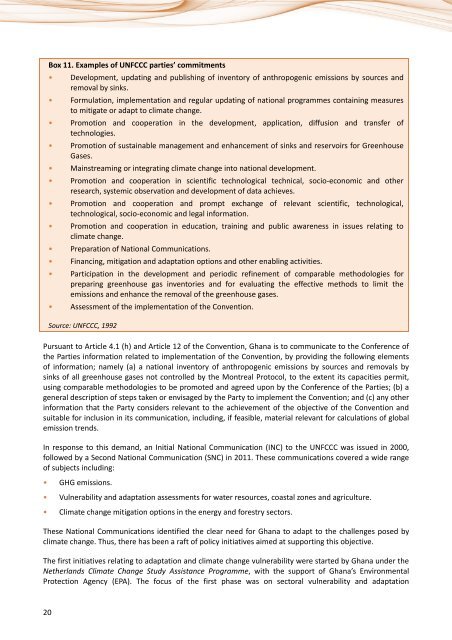Information and communication technologies (ICTs) and ... - ITU
Information and communication technologies (ICTs) and ... - ITU
Information and communication technologies (ICTs) and ... - ITU
Create successful ePaper yourself
Turn your PDF publications into a flip-book with our unique Google optimized e-Paper software.
Box 11. Examples of UNFCCC parties’ commitments<br />
• Development, updating <strong>and</strong> publishing of inventory of anthropogenic emissions by sources <strong>and</strong><br />
removal by sinks.<br />
• Formulation, implementation <strong>and</strong> regular updating of national programmes containing measures<br />
to mitigate or adapt to climate change.<br />
• Promotion <strong>and</strong> cooperation in the development, application, diffusion <strong>and</strong> transfer of<br />
<strong>technologies</strong>.<br />
• Promotion of sustainable management <strong>and</strong> enhancement of sinks <strong>and</strong> reservoirs for Greenhouse<br />
Gases.<br />
• Mainstreaming or integrating climate change into national development.<br />
• Promotion <strong>and</strong> cooperation in scientific technological technical, socio-economic <strong>and</strong> other<br />
research, systemic observation <strong>and</strong> development of data achieves.<br />
• Promotion <strong>and</strong> cooperation <strong>and</strong> prompt exchange of relevant scientific, technological,<br />
technological, socio-economic <strong>and</strong> legal information.<br />
• Promotion <strong>and</strong> cooperation in education, training <strong>and</strong> public awareness in issues relating to<br />
climate change.<br />
• Preparation of National Communications.<br />
• Financing, mitigation <strong>and</strong> adaptation options <strong>and</strong> other enabling activities.<br />
• Participation in the development <strong>and</strong> periodic refinement of comparable methodologies for<br />
preparing greenhouse gas inventories <strong>and</strong> for evaluating the effective methods to limit the<br />
emissions <strong>and</strong> enhance the removal of the greenhouse gases.<br />
• Assessment of the implementation of the Convention.<br />
Source: UNFCCC, 1992<br />
Pursuant to Article 4.1 (h) <strong>and</strong> Article 12 of the Convention, Ghana is to communicate to the Conference of<br />
the Parties information related to implementation of the Convention, by providing the following elements<br />
of information; namely (a) a national inventory of anthropogenic emissions by sources <strong>and</strong> removals by<br />
sinks of all greenhouse gases not controlled by the Montreal Protocol, to the extent its capacities permit,<br />
using comparable methodologies to be promoted <strong>and</strong> agreed upon by the Conference of the Parties; (b) a<br />
general description of steps taken or envisaged by the Party to implement the Convention; <strong>and</strong> (c) any other<br />
information that the Party considers relevant to the achievement of the objective of the Convention <strong>and</strong><br />
suitable for inclusion in its <strong>communication</strong>, including, if feasible, material relevant for calculations of global<br />
emission trends.<br />
In response to this dem<strong>and</strong>, an Initial National Communication (INC) to the UNFCCC was issued in 2000,<br />
followed by a Second National Communication (SNC) in 2011. These <strong>communication</strong>s covered a wide range<br />
of subjects including:<br />
• GHG emissions.<br />
• Vulnerability <strong>and</strong> adaptation assessments for water resources, coastal zones <strong>and</strong> agriculture.<br />
• Climate change mitigation options in the energy <strong>and</strong> forestry sectors.<br />
These National Communications identified the clear need for Ghana to adapt to the challenges posed by<br />
climate change. Thus, there has been a raft of policy initiatives aimed at supporting this objective.<br />
The first initiatives relating to adaptation <strong>and</strong> climate change vulnerability were started by Ghana under the<br />
Netherl<strong>and</strong>s Climate Change Study Assistance Programme, with the support of Ghana’s Environmental<br />
Protection Agency (EPA). The focus of the first phase was on sectoral vulnerability <strong>and</strong> adaptation<br />
20

















